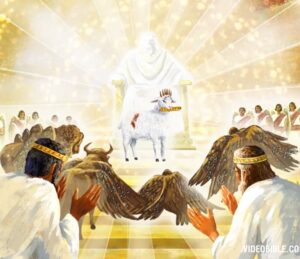Harmony is a recent addition to my treasured words*. It came to me in a time of busyness when there was more going on in my life than I was able to handle…or, at least, handle graciously. I asked God for a word. What I heard was harmony. It sounded like treasure, so I began digging.

I first went to my friends Merriam-Webster. My shovel made contact with four definitions of harmony that resonated with me. I used them to explore the Bible. No scriptures containing the word harmony had readily come to my mind, but I was sure the concept would be evident in those pages.
These are my discoveries.
The first definition that spoke to me was “a pleasing arrangement of parts.” I think that describes the word itself, how the letters in harmony have no sharp edges, only soft rolling sounds that blend together. They create smoothness, not only heard but felt deep inside. I sensed something rich coming.
We often think of harmony in relation to music. The arrangement of notes to create pleasant chords produces beautiful harmonies. I feel like I’m floating when I hear the harmony of The Carpenters or The Beach Boys.

Harmony isn’t only in music, though. We can experience it in the colors of a painting, the arrangement of furniture in a room, or organization that makes it possible to find what you need when you need it. Harmony in our surroundings is comforting. That is no surprise when you know where it comes from.
In the beginning “the earth was formless and empty, darkness was over the surface of the deep…” (Genesis 1:2). “There was no cohesion between the separate particles.” [1] From this chaos, God brought order by creating day and night, sky, water and land. Then he filled the Earth with vegetation and creatures of all kinds and with man, arranging everything perfectly and pleasingly.

Words can also be arranged pleasingly. Solomon wrote, “A word aptly spoken is like apples of gold in settings of silver” (Proverbs 25:11). He may have been thinking of the beauty of golden-colored fruit gifted to him in “vessels of open-worked silver.” [2] Truthful, kind, and encouraging words are golden. And their setting is just as important for harmony. They are spoken to the right person at the right time and in the proper manner.
The second definition is “agreement, accord.” King David said, “How good and pleasant it is when brothers live together in unity!” (Psalm 133:1). That unity among believers strengthens and refreshes us. It is where “the Lord bestows his blessing, even life forevermore” (v.3).

Paul instructs us to “live in harmony with one another” (Romans 12:16). The context urges “believers to align their thoughts with God’s will.” [3] Because we have such differing opinions, preferences, and personalities, our inward purpose must be to work together for God.
John said it this way: “If we walk in the light, as he is in the light, we have fellowship with one another” (1 John 1:7). If you and I are both living according to what God teaches, allowing ourselves to be transformed into his image, we will both share the desires of God’s heart. “The only cement that perfectly knits men to each other is their common possession of that light, and the consequent fellowship with God.” [4]

The writer of Hebrews expanded agreement to unbelievers as well. He said, “Make every effort to live in peace with all men” (Hebrews 12:14). And Paul said, “If it is possible, as far as it depends on you, live at peace with everyone” (Romans 12:18). At that time, Christians were experiencing many trials and were instructed even to strive for peace with their persecutors. The word translated peace here means “wholeness, i.e. when all essential parts are joined together.” [5] We can only be responsible for our part of the whole, but we are to use whatever means we can, short of compromising the truths of the Gospel, to pursue reconciliation and harmony with everyone.
A third definition of harmony is “internal calm: tranquility.” Though we will not always be able to have the agreement we desire with other people, internal harmony is always available. It’s that inner peace that we all crave and search for. Sadly, we often look in the wrong places, but Isaiah tells us where we will find it. “You will keep in perfect peace him whose mind is steadfast, because he trusts in you” (Isaiah 26:3).

A steadfast mind totally trusts in our unchanging God. That person is anchored to God. He relies on him rather than on his own abilities or ideas. His thinking is aligned with God’s. This agreement between trusting man and trustworthy God is what produces an unmatchable inner harmony that remains, regardless of outward disagreement or chaos.
The last definition is “an interweaving of different accounts into a single narrative.” An example is the four Gospels. Because they are written by four different men, they offer four different perspectives. Many people think the accounts conflict. However, if the accounts are all arranged in parallel fashion, the varied details weave a harmonious picture of the life, death, and resurrection of Jesus Christ on Earth.
This idea of a single narrative has shown up in all the other harmony definitions. Objects and sounds are arranged for the bigger ascetic experience. Words used properly draw individuals into unity. Agreement among people is possible because of singleness of mind. And our inner peace is assured when the will of the created aligns with the will of the Creator.
The whole is greater than the parts, and it unites the parts. This is gloriously illustrated in Revelation, the last book in the Bible, which is largely about future events. There will be a gathering in heaven when all focus is on the Lamb, Jesus Christ. “…a great multitude…from every nation, tribe, people and language” will stand before him, singing his praises (Revelation 7:9). The voices of tens of thousands of angels will join in. But there is still more in God’s revelation to John.

“Then I heard every creature in heaven and on earth and under the earth and on the sea, and all that is in them, singing: ‘To him who sits on the throne and to the Lamb be praise and honor and glory and power, for ever and ever!’” (Revelation 5:13). Along with men and angels, even the creatures will recognize and honor the Father and the Son. This will be the ultimate harmony, like nothing we have ever heard. The Beach Boys aren’t even in the same galaxy.
I don’t think the harmony will be from the blending of beautiful tones or how the parts are assigned or the musicality of the participants. I believe the amazing harmony will be the product of all individual differences and self being put aside and all hearts united in a singular outpouring of devotion to their Creator and Redeemer.
Indeed, I found harmony throughout the Bible—from Genesis to Revelation. After all, God is the creator of harmony, and there can be no harmony without him.
Harmony is
- God’s order in my environment and relationships
- preferring you over me
- my will aligned with my Father’s will
- all creation worshiping Jesus with one heart
This is why harmony is a word in my treasure chest.

*Treasured Words are words that have special value to me. Hearing them causes brilliant light and comforting warmth to radiate from a place deep inside me and fill my soul with a sense of well-being.
[1] Ellicott’s Commentary
[2] Barnes’ Notes on the Bible
[3] Topical Lexicon
[4] MacLaren’s Expositions
[5] HELPS Word-studies
Commentary notes are from Bible Hub. See Resources.
Feature photo by Kev Kindred on Unsplash
Scripture quotations are from NIV.




Brenda+Murphy
May 15, 2025That’s a great treasured word! I’ve never thought much about it. How interesting to see it laid out in this context. I like this, “The whole is greater than the parts, and it unites the parts.” It’s seeing the big picture from God’s viewpoint because in him all is in harmony. Interesting!
Bonnie
May 15, 2025In Him all is in harmony–and when I’m not walking in harmony with Jesus, nothing else feels harmonious.
I had never thought about the concept of harmony in the Bible. I loved finding it from beginning to end. It’s so complete. Just like God! 🙂
Thanks for your thoughts, Brenda!
ME
May 15, 2025Bonnie, I really liked this one! God’s spirit led to you to find the perfect definitions of harmony in God’s word! We are studying Revelation in my small group and I especially enjoyed that part!
Bonnie
May 15, 2025Definitions and scripture aligned so harmoniously. Thank you, Becky.
My small group is studying Revelation, too!